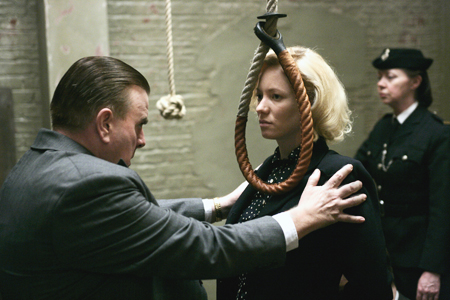|
Reviews of Recent Independent, Foreign, & Documentary Films in Theaters and DVD/Home Video
Directed by: Adrian Shergold. Written by: Jeff Pope and Bob Mills. Produced by: Christine Langan. Director of Photography: Danny Cohen. Edited by: Tania Reddin. Music: Martin Phipps. Released by: IFC First Take. Country of Origin: UK. 90 min. Rated R. With: Timothy Spall, Juliet Stevenson & Eddie Marsan. Capital punishment in Britain gets the Vera Drake treatment in Pierrepoint – The Last Hangman, told from the perspective of Albert Pierrepoint, Britain’s most famous executioner, who carried out over 400 hangings from 1932 to 1956. Director Adrian Shergold credits Leigh as a London theater mentor, and star Timothy Spall, a frequent Leigh Everyman, recalls here his subtle portrayal in Leigh’s All or Nothing. Even as his secret and part-time job takes its toll on his colleagues, Pierrepoint’s precise and calm demeanor stays focused on his professionalism. His pride centers around his special formula – calculations of height, weight and body type passed on from his father and uncle for the length and type of rope needed to accomplish the quickest death (down to seven seconds for the most anxious convict) and the most painless as possible. After executions, moving scenes provide sympathetic insights, depicting his care in washing and preparing the naked, now “innocent,” bodies. It is more startling to suddenly see him relax at a pub performing music hall tunes in a duo as “Tosh” with his drinking buddy he knows only as “Tish” (a sweet Eddie Marsan). Pierrepoint’s shy courting of store clerk Anne Fletcher glides into a calm marriage. Unlike his mother, who ignores the family business, Anne becomes more and more curious and ties together newspaper reports with his diary, which she secretly reads, and his extra income outside of his grocery delivery job. As a very practical woman, Juliet Stevenson’s Anne manages to be more than just a nag about his financial arrangements for the hangings and ambitiously takes over her husband’s bookkeeping. Everything changes in their lives, as well as in the film’s style, when his role suddenly becomes public knowledge. Pierrepoint, asked by Monty himself, Field Marshal Bernard Montgomery, carries out the death sentences from the British-run war criminal trials in Germany, starting with “the Beast of Belsen” commandant, leading eventually to over 200 executions of convicted Nazis. With the Pierrepoints’ movie night interrupted by a newsreel of the horrors of the concentration camps, the film doesn’t stint on the crimes of the unrepentant Nazis he is assigned to efficiently dispatch at the gallows. But in a surprising un-Leigh touch, the montage of a long day’s toil – the women SS officers one by one, the men in pairs – is set to a Strauss waltz, going a bit over the top in pointedly commenting on this final solution. But just as with his civilian jobs, Pierrepoint insists on not knowing their individual crimes but on their proper burial, carrying out the legal mandates as compassionately as possible. In the flush of post-war patriotism, the British populace salutes Pierrepoint as a war hero. But anti-capital punishment sentiment gradually impinges on Pierrepoint’s duties, consciousness, and public perception, especially the protests surrounding the last woman hanged in Britain, Ruth Ellis (whose 1955 case was dramatized in Dance with a Stranger), and Timothy Evans, whose later exoneration inspired the film 10 Rillington Place and increased pressure towards abolition of the death penalty for murder in the UK in 1965. (Let Him Have It dealt with another of Pierrepoint’s assignments.) While it is dramatically predictable that Pierrepoint’s rigid self-control will at some point break, writers Jeff Pope and Bob Mills telescope facts and exaggerate situations for heightened effect, as usual for biopics, from the subtitle (a couple of executioners continued their work after Pierrepoint) to his relationship with a murderer. Pierrepoint’s 1974 autobiography is quoted at the close: "I have come to the conclusion that executions solve nothing, and are only an antiquated relic of a primitive desire for revenge.” But in later interviews, he changed his mind again about capital punishment as Britain’s crime rate increased.
Co-produced for television by Granada in Britain and PBS’s Masterpiece Theatre, this IFC First Take release is also available on digital video
on demand.
Nora Lee Mandel
|

